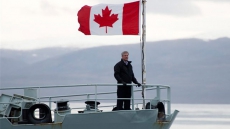NEW YORK - For all its much-touted toughness in imposing economic sanctions against Russia, Canada has been significantly more timid against one particular target: the oil industry.
A database of sanctions compiled by The Canadian Press suggests Canada has been almost three times less likely to penalize Russian oil companies than the United States.
The Harper government has imposed economic penalties against five Russian oil companies, compared to 13 firms targeted in that same sector by the U.S.
That's despite the fact that in its vast array of more than 175 sanctions targets, Canada has been as tough as the U.S. — if not tougher — on other segments of Russian society, including private citizens, the defence industry, mining, and financial-services companies.
The oil and gas sector is a clear statistical exception, representing about 13.8 per cent of Canadian sanctions against companies imposed during the Ukraine crisis. By way of comparison, the proportion is about 29.5 per cent in the U.S. and 20 per cent in the European Union.
Also, four of Russia's largest oil companies and its dominant pipeline company have faced sanctions in either the U.S., Europe, or both: Rosneft, Lukoil, Surgutneftgas, Gazprom, and the state-run pipeline monopoly Transneft.
Not one of them has faced such measures from Canada.
In an interview, Canada's industry minister said he hasn't heard any complaints from the opposition or regular citizens about the approach to sanctions.
"There has been none of that," Industry Minister James Moore said.
"There's been a unified Canadian understanding that the position of Stephen Harper is the correct one, morally. It won't be without its frustrations for some people who have had long business ties with Russia — but certainly some things are more important."
But when asked whether the government might follow the U.S. with sanctions against influential Vladimir Putin ally Igor Sechin and Rosneft, the No. 1 Russian oil company that has Sechin as its chairman, Moore said: "I don't have any comment on that."
The Canadian government will be on the international stage this week promoting its robust response to Russia's intervention in Ukraine, as Prime Minister Stephen Harper makes it one of the themes of his address to the United Nations General Assembly.
Canada has, in fact, imposed more sanctions overall than either the U.S. or Europe. The Canadian Press compiled a database that shows Canada with 175, not including several against more amorphous entities like "the Federal State of Novorossiya," which is also on the Canadian list.
As for why Russian oil is so scarce on that same list, one academic who has researched the geopolitical reach of Russia's oil industry says there might be an extremely simple explanation: human oversight.
David Detomasi of Queen's University says Canadian interests there are relatively minor. They're mostly limited to providing logistical help with extraction — and don't extend to actual drilling or ownership stakes, which American oil companies actually do have there. Exxon Mobil has just had to pause drilling in Russia's Arctic because of American sanctions.
"Since we don't have a huge amount of interests in Russian oil," Detomasi said, "it could simply be something that hasn't been attended to yet."
That being said, some Canadian companies do actually point to Russia as being integral to their long-term growth strategy.
Calgary-based Trican Well Service Ltd. said in its latest quarterly report that Russian operations accounted for the majority of its international earnings. The company employs more than 5,800 people and said its job count increased 27 per cent, thanks mainly to Russian earnings.
"We do not anticipate any disruptions to our Russian business throughout the remainder of 2014 based upon the sanctions that have been imposed to date," the company reported.
"However, we will continue to monitor this situation closely as it does raise additional business risks in the region."
Another Calgary company touts its work for three of Russia's biggest oil and gas companies. Calfrac Well Services says it made $158 million in revenues from Russia last year. While its revenue in that country is smaller than in Canada and the U.S., it's growing fast. It reported having placed 400 horizontal fracturing stages in Russia in 2013 — nearly 10 times the previous year's amount.





